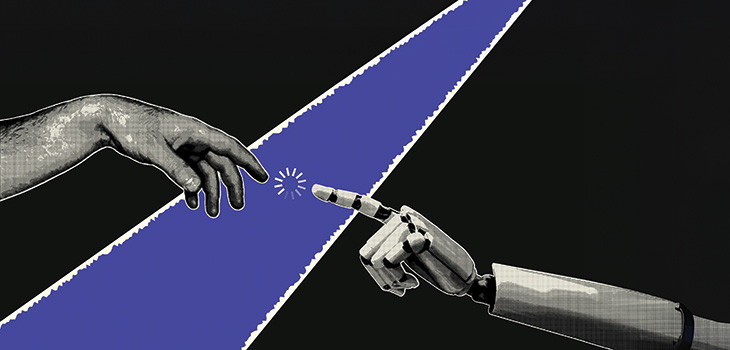*/

How to cross-examine your Gen AI tools and interrogate the outputs? Sally McLaren’s tips for using AI safely in legal research
Unless you’ve been completely off-grid for the past 12 months or so, you’ve likely encountered the deluge of news, articles, explainers, and enthusiastic LinkedIn posts about the wonders and/or terrors of Generative AI.
If you have been offline and missed it all, then congratulations! It’s been a lot! This bit is for you. The AI savvy/weary may skip ahead:
The term ‘artificial intelligence’ (AI) has been in use since the 1950s and refers to the simulation of human intelligence in machines, enabling them to perform tasks that typically require human-like understanding, reasoning, learning, and problem-solving.
Generative AI (Gen AI) is a type of AI that can create or generate content, such as text, images, or other data, by learning from large datasets and producing novel outputs based on observed patterns. Popular examples include: ChatGPT, Claude and Gemini.
There are probably as many Gen AI evangelists as there are prophets of doom, but in between the two camps is a DMZ populated by many more wary adopters, curious skeptics and AI casuals. It is increasingly unrealistic to think that students, pupils, barristers, or indeed law librarians, won’t be using Gen AI. Quite the opposite. Leveraging these new tools is fast becoming a marketable skill. However, as useful as Gen AI can be, there is a significant degree of risk attached to employing it in your studies and practice.
Here are eight tips to help minimise the risks associated with using Gen AI:
Gen AI is just another tool to be leveraged, albeit carefully. Investing time in mastering this new skill and learning more about risks and effective use is key. Explore a curated list of online courses, many of which are free, here.

Unless you’ve been completely off-grid for the past 12 months or so, you’ve likely encountered the deluge of news, articles, explainers, and enthusiastic LinkedIn posts about the wonders and/or terrors of Generative AI.
If you have been offline and missed it all, then congratulations! It’s been a lot! This bit is for you. The AI savvy/weary may skip ahead:
The term ‘artificial intelligence’ (AI) has been in use since the 1950s and refers to the simulation of human intelligence in machines, enabling them to perform tasks that typically require human-like understanding, reasoning, learning, and problem-solving.
Generative AI (Gen AI) is a type of AI that can create or generate content, such as text, images, or other data, by learning from large datasets and producing novel outputs based on observed patterns. Popular examples include: ChatGPT, Claude and Gemini.
There are probably as many Gen AI evangelists as there are prophets of doom, but in between the two camps is a DMZ populated by many more wary adopters, curious skeptics and AI casuals. It is increasingly unrealistic to think that students, pupils, barristers, or indeed law librarians, won’t be using Gen AI. Quite the opposite. Leveraging these new tools is fast becoming a marketable skill. However, as useful as Gen AI can be, there is a significant degree of risk attached to employing it in your studies and practice.
Here are eight tips to help minimise the risks associated with using Gen AI:
Gen AI is just another tool to be leveraged, albeit carefully. Investing time in mastering this new skill and learning more about risks and effective use is key. Explore a curated list of online courses, many of which are free, here.
How to cross-examine your Gen AI tools and interrogate the outputs? Sally McLaren’s tips for using AI safely in legal research


The Bar Council is ready to support a turn to the efficiencies that will make a difference
By Louise Crush of Westgate Wealth Management
Marie Law, Director of Toxicology at AlphaBiolabs, examines the latest ONS data on drug misuse and its implications for toxicology testing in family law cases
An interview with Rob Wagg, CEO of New Park Court Chambers
What meaningful steps can you take in 2026 to advance your legal career? asks Thomas Cowan of St Pauls Chambers
Marie Law, Director of Toxicology at AlphaBiolabs, explains why drugs may appear in test results, despite the donor denying use of them
The appointments of 96 new King’s Counsel (also known as silk) are announced today
Ready for the new way to do tax returns? David Southern KC continues his series explaining the impact on barristers. In part 2, a worked example shows the specific practicalities of adapting to the new system
Resolution of the criminal justice crisis does not lie in reheating old ideas that have been roundly rejected before, say Ed Vickers KC, Faras Baloch and Katie Bacon
With pupillage application season under way, Laura Wright reflects on her route to ‘tech barrister’ and offers advice for those aiming at a career at the Bar
Jury-less trial proposals threaten fairness, legitimacy and democracy without ending the backlog, writes Professor Cheryl Thomas KC (Hon), the UK’s leading expert on juries, judges and courts